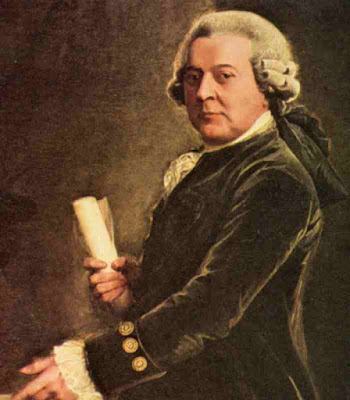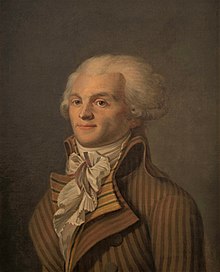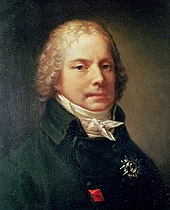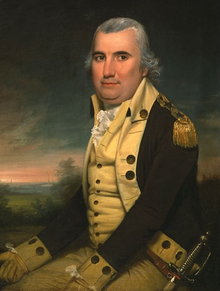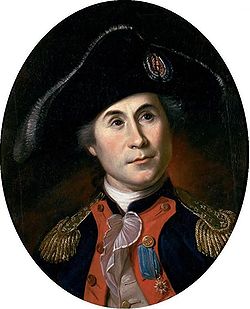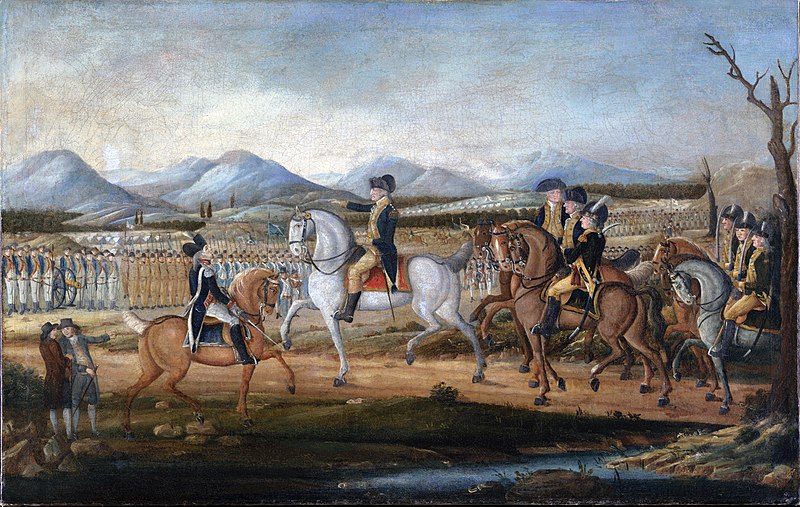Before I start, this TL has numerous PoD's which don't get immediately revealed, like my successful American King TL. Only the effects are demonstrated at the beginning, and we explore what the PoD's were as we go along. It enables for more freedom of creativity. For instance, Washington picks Adams as his VP, instead of beating him and Adams automatically getting the position. Also, any recommendations are welcomed, as well as corrections.  Oh, and don't mistake Adams and Hamilton for evil villains; they just love America so much they'll do *anything* to "save" it.
Oh, and don't mistake Adams and Hamilton for evil villains; they just love America so much they'll do *anything* to "save" it.
"What Madness Is This?"
John Adams' Fateful Presidency Changes History Forever

Emblem of the Federalist Party
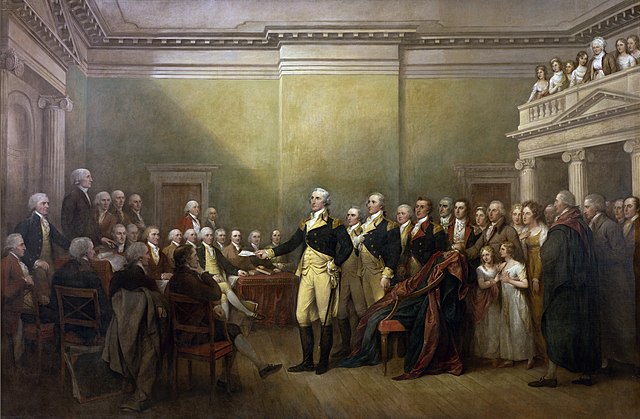
General Washington formally announces before the Congress that he will not seek a third term.
"What Madness Is This? That brother might fight brother, and father might fight son? That countless homes and families be ripped asunder all for the sake of their piece of dirt? of their political party? Why must we hate each other so?"
-Thomas Jefferson
"The said States hereby severally enter into a firm league of friendship with each other, for their common defense, the security of their liberties, and their mutual and general welfare, binding themselves to assist each other, against all force offered to, or attacks made upon them, or any of them, on account of religion, sovereignty, trade, or any other pretense whatever. The President of these United States in Congress Assembled, elected for four years at a time by the Members of the Congress Assembled, is to keep these Articles observed and to be chief negotiator of state relations, captain of international diplomacy, and has the right to form alliances, form trade agreements, and go to war upon consent of the Congress here Assembled on this day in the Year of Our Lord, March the First, Seventeen Hundred and Eighty-One, and all future Congresses Assembled, So Help Us God."
-Articles of Confederation and Perpetual Union
President Washington's masterful taping-together of the states while following the Articles of Confederation and Perpetual Union was emblematic of the man's personal strength of character, mental fortitude, and extremely able political skills. Other Presidents of the United States in Congress Assembled had preceded him, but none had been given so much power to consolidate the nation's strength. Washington had gotten all of the Thirteen Colonies to agree with the Articles, and had served two terms. When he stepped down after completing the second four-year term, he was visibly aged. He claimed that, while he served to protect the Articles, they simply were a poor excuse for something such a large government should operate on. He also claimed that "the States will walk all over future presidents. I pity the men who get my position. God bless them." The Good General also worried that future presidents might find a way to abuse their power, which was one reason why he stepped down after his second term, hoping to set an example to those who would follow.
The man who was eager to get into Washington's seat of power was none other than one of the men whose political maneuvering had prevented the adoption of a document stronger than the Articles: John Adams. He had very little in common with Washington when he served as his vice president; another of Washington's ideas was to have presidents and vice presidents be from opposing parties or ideologies. Adams, however, wasn't about to pick Thomas Jefferson, the writer of the Declaration of Independence. Many were avidly campaigning for Jefferson to get the job, but Adams would have none of it. The two men simply did not get along. Washington was accommodating and listened to what Adams had to say. Jefferson, to Adams, was a self-righteous Anti-Federalist and had come close to screaming in Adams' face when the Federalists blocked the request from Washington for a new "Constitution of the States." Adams and his men knew that if the Articles went down, so would they, and their dreams for a strong centralized government would be over.
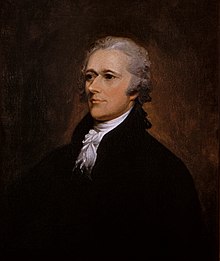
Alexander Hamilton
So, when Alexander Hamilton was picked by Adams as his vice president, it came as little surprise to most. Hamilton was a quasi-monarchist who had advocated Washington become an American King years before. Loved by some, hated by many, Hamilton was a target for severe political attack, but the Federalists were determined to pull him and Adams over the finish line... by whatever means necessary.
The Federalists outright bribed the Congressmen to get votes. When Jefferson requested that an amendment be made to the Articles allowing "free and fair elections by the people of these States," the Federalists had difficulty taking him seriously. Surely, they thought, putting the right to vote for who would be President in the hands of the uneducated mobs was a pure, terrible, folly, and all manner of crackpots and lunatics could win. Then, oily Hamilton arrived at a new idea. A very, very corrupt one. But it was for "the Good of the Union."
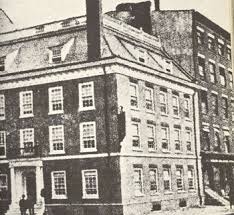
Fraunces Tavern, home of the 1796 Federalist Convention
Strong government was their motto among themselves, even though they knew it would not be popular among the people to phrase it that way. So, they promised whatever the people wanted, knowing it wouldn't matter. Benjamin Franklin finished assisting the Congress draft the amendment that enabled elections and then, loosing his balance and falling down the steps in front of Independence Hall, died two days later.
Adams liked the Old Man as well as anyone, but Franklin had sided with the independents like Washington, and more than not drifted toward the Anti-Federalists. Plus, the last thing Adams and Hamilton needed was for Franklin to use his genius to figure out the ballot-stuffing and giving some wise quip, bringing the entire Federalist Party into the gutter. Yes, Franklin's death was quite convenient for them, no matter how sad.
When it came time for the election, only white males over the age of twenty were allowed to vote. When the votes were being counted at their respective state capitols, the Federalists went to work. Stuffing, erasing, re-writing, and voting multiple times. It was a dark day of cheating, bribery, and outright corruption on an incredible scale. The cheating was accompanied by an unimaginable amount of anti-Jefferson propaganda, accusing the Declaration of Independence author of outright atheism.

Adams and Hamilton knew, though, that if too much of the vote percentage went for them, people would become suspicious. So, they had dispatched orders to make sure it wasn't a ridiculous victory. 60, 65, or 70 percent of the vote would seem believable but strong. Yes, around that number would put the Federalists in the "we have a mandate from The People to accomplish our agenda" zone. Thus, three weeks later, when all was said and done, John Adams became the Seventeenth President of the United States in Congress Assembled, and Hamilton became the Vice President of the same.
With Adams and Hamilton in the Presidential Mansion, the Federalists entered their own metaphorical high castle on a hill and started, after a few months, to drift farther and farther away from political reality. Before long, everything was an elected position, and cheating had the Federalists running victory laps all around Philadelphia, the national capital.
And that leads to one of the first acts the Federalist government ordered, that the national capital and capitol be moved to New York City, the heart of the Federalist Party.

John Adams
After a year, beginning around June of 1798, the citizens began to feel openly resentful of Adams and Hamilton's "pseudo-monarchy." Most longed for the days of the apolitical Washington, and his patriotic policies. The Federalists were even starting to take away some basic rights, like when a newspaper editor in South Carolina, Joshamee Worthington, wrote that Adams should be removed from office and that Hamilton was a "pointy-nosed lying bastard-prince," the South Carolina state militia raided his offices and arrested him, holding him for two weeks in a moldy prison until public outcry demanded his release.
Things continued escalating, and the Federalists were thrown into a panic in New York.
The man who was eager to get into Washington's seat of power was none other than one of the men whose political maneuvering had prevented the adoption of a document stronger than the Articles: John Adams. He had very little in common with Washington when he served as his vice president; another of Washington's ideas was to have presidents and vice presidents be from opposing parties or ideologies. Adams, however, wasn't about to pick Thomas Jefferson, the writer of the Declaration of Independence. Many were avidly campaigning for Jefferson to get the job, but Adams would have none of it. The two men simply did not get along. Washington was accommodating and listened to what Adams had to say. Jefferson, to Adams, was a self-righteous Anti-Federalist and had come close to screaming in Adams' face when the Federalists blocked the request from Washington for a new "Constitution of the States." Adams and his men knew that if the Articles went down, so would they, and their dreams for a strong centralized government would be over.

Alexander Hamilton
The Federalists outright bribed the Congressmen to get votes. When Jefferson requested that an amendment be made to the Articles allowing "free and fair elections by the people of these States," the Federalists had difficulty taking him seriously. Surely, they thought, putting the right to vote for who would be President in the hands of the uneducated mobs was a pure, terrible, folly, and all manner of crackpots and lunatics could win. Then, oily Hamilton arrived at a new idea. A very, very corrupt one. But it was for "the Good of the Union."
Fraunces Tavern, home of the 1796 Federalist Convention
The idea was to allow the Jeffersonians to go through with amending the Articles. Then, Federalists would stuff the ballots for Adams to keep "those lunatics Jefferson and Madison" from attaining power. Adams and a small group of elite Federalists, including Hamilton, Thomas and Charles Cotesworth Pinckney, and Rufus King, gathered in Fraunces Tavern, in the adopted Federalist capital of New York City, for a mini-convention. In secret, the men discussed their "ingenious" plans over some ale, and layed out the plot. Hamilton took charge, with Adams being reluctant at first, being somewhat honest even if he was power-hungry. A few others resisted as well. Hamilton eventually dragged them to accept it in the name of the "public good." The Federalists were what America needed, he proclaimed, and the Anti-Federalists would bring about the "promiscuity of the States." An ironic line, considering Hamilton himself was the bastard son of two loose persons in the Caribbean colonies. More plans were drawn up to prevent any more Federalists than necessary from learning of the plot.
Strong government was their motto among themselves, even though they knew it would not be popular among the people to phrase it that way. So, they promised whatever the people wanted, knowing it wouldn't matter. Benjamin Franklin finished assisting the Congress draft the amendment that enabled elections and then, loosing his balance and falling down the steps in front of Independence Hall, died two days later.
Adams liked the Old Man as well as anyone, but Franklin had sided with the independents like Washington, and more than not drifted toward the Anti-Federalists. Plus, the last thing Adams and Hamilton needed was for Franklin to use his genius to figure out the ballot-stuffing and giving some wise quip, bringing the entire Federalist Party into the gutter. Yes, Franklin's death was quite convenient for them, no matter how sad.
When it came time for the election, only white males over the age of twenty were allowed to vote. When the votes were being counted at their respective state capitols, the Federalists went to work. Stuffing, erasing, re-writing, and voting multiple times. It was a dark day of cheating, bribery, and outright corruption on an incredible scale. The cheating was accompanied by an unimaginable amount of anti-Jefferson propaganda, accusing the Declaration of Independence author of outright atheism.
Adams and Hamilton knew, though, that if too much of the vote percentage went for them, people would become suspicious. So, they had dispatched orders to make sure it wasn't a ridiculous victory. 60, 65, or 70 percent of the vote would seem believable but strong. Yes, around that number would put the Federalists in the "we have a mandate from The People to accomplish our agenda" zone. Thus, three weeks later, when all was said and done, John Adams became the Seventeenth President of the United States in Congress Assembled, and Hamilton became the Vice President of the same.
List of Presidents of the United States in Congress Assembled:
- Peyton Randolph (September 5, 1774 - October 22, 1774) Virginia
- Henry Middleton (October 22, 1774 - October 26, 1774) S. Carolina
- Peyton Randolph (May 10, 1775 - May 24, 1775) Virginia
- John Hancock (May 24, 1775 - October 29, 1777) Mass.
- Henry Laurens (November 1, 1777 - December 9, 1778) S. Carolina
- John Jay (December 10, 1778 - September 28, 1779) New York
- Samuel Huntington (September 28, 1779 - July 10, 1781) Connecticut
- Thomas McKean (July 10, 1781 - November 5, 1781) Delaware
- John Hanson (November 5, 1781 - November 4, 1782) Maryland
- Elias Boudinot (November 4, 1782 - November 3, 1783) New Jersey
- Thomas Mifflin (November 3, 1783 - June 3, 1784) Pennsylvania
- Richard Henry Lee (November 30, 1784 - November 4, 1785) Virginia
- John Hancock (November 23, 1785 - June 5, 1786) Massachusetts
- Nathaniel Gorham (June 6, 1786 - November 3, 1786) Massachusetts
- Arthur St. Claire (February 2, 1787 - November 4, 1787) Pennsylvania
- Cyrus Griffin (January 22, 1788 - November 15, 1788) Virginia
- New Amendment to Articles allows four year terms with no limit on how many times someone may run
- George Washington (April 30, 1789 - March 4, 1797) Virginia
- New Amendment to Articles allows election by popular vote
- John Adams (March 4, 1797 - ) Massachusetts
With Adams and Hamilton in the Presidential Mansion, the Federalists entered their own metaphorical high castle on a hill and started, after a few months, to drift farther and farther away from political reality. Before long, everything was an elected position, and cheating had the Federalists running victory laps all around Philadelphia, the national capital.
And that leads to one of the first acts the Federalist government ordered, that the national capital and capitol be moved to New York City, the heart of the Federalist Party.
John Adams
After a year, beginning around June of 1798, the citizens began to feel openly resentful of Adams and Hamilton's "pseudo-monarchy." Most longed for the days of the apolitical Washington, and his patriotic policies. The Federalists were even starting to take away some basic rights, like when a newspaper editor in South Carolina, Joshamee Worthington, wrote that Adams should be removed from office and that Hamilton was a "pointy-nosed lying bastard-prince," the South Carolina state militia raided his offices and arrested him, holding him for two weeks in a moldy prison until public outcry demanded his release.
Things continued escalating, and the Federalists were thrown into a panic in New York.
Last edited:
